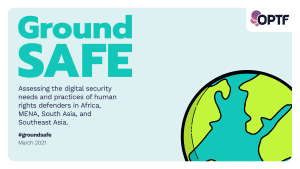Ground Safe: Assessing the digital security needs and practices of human rights defenders
April 06, 2021 / Current Affairs, Digital Security, Press Freedom, Data Privacy / By OPTF
Freedom of expression is essential to preserving democracy and human rights all around the world. Activists must be able to gather and organise, journalists must be able to report, advocates and lawyers must be able to speak out and protect fundamental rights. Over the course of the last two decades, many people defending human rights have relied heavily on technology to carry out their work — things like the internet, smart phones, and social media are used heavily.
However, those in power are now using those very same tools to curb the work of human rights defenders. Cyber laws, internet shutdowns, digital surveillance, and online attacks and harassment are being adopted by democratic (and not-so-democractic) governments to disrupt critical voices and those working to uplift and defend human rights.
The OPTF is proud to have completed the Ground Safe report, a study analysing the digital security needs and practices of journalists, activists, and other human rights defenders across 13 countries in Africa, MENA, South Asia, and Southeast Asia.
Digital security training and practice is a key component for preserving the internet as a liberating force — as it was originally envisioned. However, Ground Safe finds that urgent improvements are needed in order to keep human rights defenders safe — especially those who working in adversarial conditions.
Based on extensive interviews and surveys with people working on the ground in the countries analysed, Ground Safe makes key recommendations on the steps required to build a safer digital future for human rights defenders, including:
Increase awareness of digital threats and vulnerabilities: Including using common and consistent language to describe threats, vulnerabilities, and mitigation strategies; improving the documentation of digital security incidents involving human rights defenders; increasing the media coverage and public discourse of digital attacks targeting human rights defenders.
Improve digital security training and practice: Including real and relatable examples of digital threats and attacks; digital security training programs that are localised and led by local trainers; incorporation of tool practice in training programs; training programs that are designed specifically to engage the target participants.
Build secure tech tools and apps that work effectively: Including improving analysis and understanding of the specific digital needs of human rights defenders in their context; localising tools for language; establishing user-testing and feedback groups that represent the diversity of human rights defenders; diversifying the security designs and solutions being deployed in tools; identifying new sources of funding and investment; being transparent about the weaknesses, vulnerabilities, and functionality gaps of technology tools — there is no one-size-fits-all solution.
Enhance organisation-level digital security practices: Including informing management and board members of civil society organisations about digital threats to their work; providing organisations with digital security procedures and policy templates; digital security compliance as a prerequisite for donor funding.
The report also includes by-country analysis and context for Ethiopia, Tanzania, Egypt, Iran, Iraq, Lebanon, India, Pakistan, Indonesia, the Philippines, Myanmar, Thailand, and Vietnam. A focused case study of Indonesia was also completed via a survey of 90 journalists, activists, and other human rights defenders living and working in the country.
We worked alongside partner organisations Blueprint for Free Speech, ASL19, Engage Media, and the Indonesian Association for Media Development, and published the completed research in March 2020.
The key takeaway from the research is that although there is a very high level of concern over digital attacks and threats, the adoption mitigation strategies and digital security practice remains low. More has to be done by support organisations, including secure tech builders to ensure that human rights defenders can do their critical work safely.
The full report can be accessed here.
Latest blog posts
The OPTF and Session
The OPTF is transferring its responsibilities as steward of the Session project to the newly established Swiss foundation, the Session Technology Foundation.
READ MORE »
October 15, 2024
Cyber laws around the world: Privacy is not the policy
There is no doubt that the European Union’s GDPR has changed the cyber regulation landscape forever. As onlookers from non-EU countries urge their governments and regulators to adopt similar legislation, countries are rapidly adopting their
READ MORE »
December 04, 2022
The long and winding road : Striving for data protection in Indonesia
Juliana Harsianti is an independent researcher and journalist working at the intersection of digital technology and social impact. The long awaited Indonesian Personal Data Protection Bill was approved by the parliament on 20 September 2022.
READ MORE »
November 17, 2022
